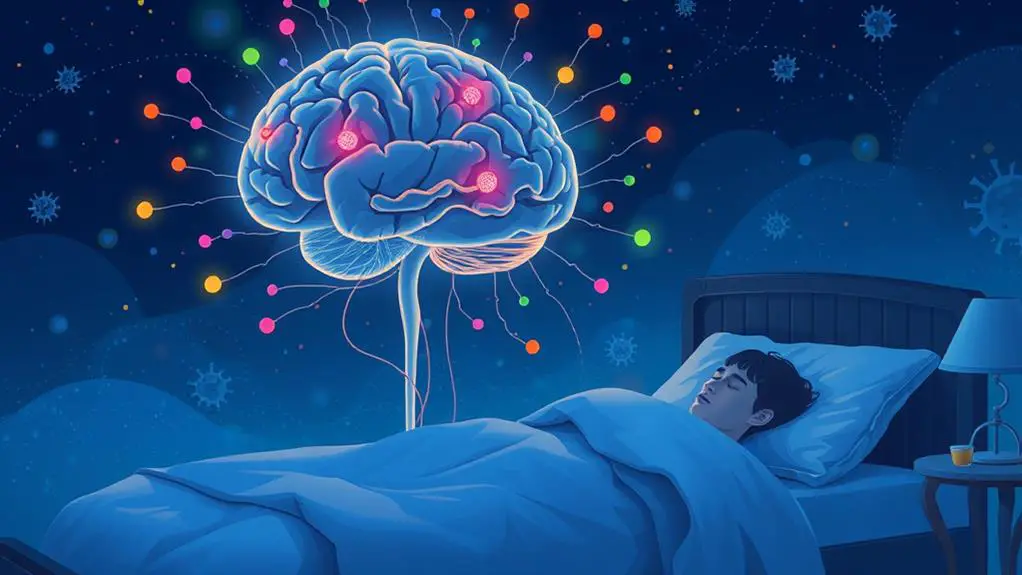
Switching to a ketogenic diet, known for its low carb and high-fat approach, can mix things up with your sleep. At first, the lack of carbs might keep you tossing and turning, thanks to changes in hormones and energy use. But don't worry—many people find their sleep improves once their body gets used to burning fat for fuel. You might even end up with deeper, more rejuvenating sleep! Just remember, everyone's different, and you might need some tweaks to see the benefits. Hang tight, and you might discover the secrets to sleeping like a baby on a keto diet!
Key Takeaways
- The ketogenic diet can initially cause sleep disturbances like insomnia due to hormonal and metabolic adjustments.
- Improved sleep quality is often reported after the body adapts to ketosis, with increased slow-wave sleep enhancing restorative rest.
- Lower carbohydrate intake can disrupt melatonin production, impacting sleep-wake cycles and reducing REM sleep.
- Adequate nutrient intake, including magnesium and B vitamins, supports neurotransmitter production and mitigates sleep disturbances.
- Gradual transition into the ketogenic diet, consistent sleep schedules, and optimized sleep environments can help manage keto-related insomnia.
Understanding Keto Insomnia
Understanding keto insomnia is essential for individuals moving to a ketogenic diet, as it highlights the potential sleep disturbances linked to this dietary change.
Keto insomnia refers to the sleep problems some people face when they start a keto diet. These issues can include trouble falling asleep, waking up often, and feeling restless. This happens because cutting down on carbs can mess with your levels of melatonin and adenosine, two chemicals that help you sleep.
When you first switch to a low-carb diet, you might find it hard to get a good night's sleep. This phase is called keto adaptation. Your body is getting used to burning fat for energy instead of carbs, which can be a rough ride.
Sometimes, this is due to not getting enough L-tryptophan, a nutrient that helps make melatonin.
But don't worry, many people find their sleep improves once their bodies get used to the new diet. To manage keto insomnia, try to ease into the diet slowly, drink plenty of water, and practice good sleep hygiene.
This means keeping your bedroom cool, dark, and quiet, and maybe even doing some relaxation exercises before bed.
Symptoms of Keto Insomnia
The symptoms of keto insomnia, often likened to a restless night under a flickering neon sign, encompass a range of sleep disturbances that can greatly impact one's quality of life. When beginning a ketogenic diet, individuals may encounter several troubling changes in sleep patterns, especially during the initial phase. These disturbances can make the nights seem longer and more exhausting than ever before.
Among the most frequently reported symptoms are:
- Difficulty falling asleep: Many find themselves staring at the ceiling, unable to drift off despite feeling tired.
- Fragmented sleep: Even if sleep does come, it often breaks repeatedly, leading to frequent awakenings throughout the night.
- Restlessness: The sense of tossing and turning can be overwhelming, making it hard to find a comfortable position.
- Daytime fatigue: The lack of quality sleep leaves individuals feeling sluggish and drained during the day.
These issues often arise due to nutritional deficiencies, particularly in L-tryptophan, a precursor for melatonin production, which is essential for regulating sleep.
Additionally, the strict carbohydrate restriction can disrupt sleep-regulating chemicals like melatonin and adenosine.
While these symptoms may diminish as the body adapts, the initial phase of dietary adjustments can be quite challenging.
Causes of Sleep Disturbances
Sleep disturbances during the ketogenic diet, often referred to as keto insomnia, can be attributed to several physiological and biochemical changes triggered by the dietary shift.
One major cause is carbohydrate withdrawal. Carbs are fundamental for producing L-tryptophan, a building block for melatonin, the hormone that regulates sleep. Without enough carbs, your body struggles to produce melatonin, making it hard to fall and stay asleep.
Hormonal imbalance is another culprit. The quick shift to low-carb eating can mess with hormones like melatonin and adenosine, which are essential for sleep. This can lead to tossing and turning all night long.
Also, nutrient depletion, especially in magnesium and B vitamins, can happen due to the strict keto diet. These nutrients are critical for good sleep quality, and without them, you might find yourself staring at the ceiling instead of snoozing.
The stress response also plays a role. Low carbs can spike cortisol levels, the stress hormone, which can make you feel anxious and disrupt your sleep patterns.
Individual Variability
Individual responses to the keto diet can be quite different, especially when it comes to sleep.
Some people might find their sleep improves over time, while others could struggle with issues like insomnia.
Factors like age, health conditions, and how strictly they follow the diet all play a role in how each person adapts and how their sleep is affected.
Different Sleep Responses
Responses to the ketogenic diet can vary widely among individuals, particularly concerning sleep patterns. While some people quickly notice improved sleep quality, others might face sleep disturbances like insomnia. This variability often ties back to individual dietary habits and how one's body reacts to the changes in macronutrient intake.
In the initial phase of the keto diet, sleep disruptions are common. The sudden drop in carbohydrate intake can mess with your body's production of serotonin and melatonin, both key players in regulating sleep. It's like suddenly switching your favorite bedtime story—your body takes time to adjust.
However, many people report that their sleep quality improves once they get used to ketosis.
A study of 324 overweight women found significant improvements in sleep quality after a month on a very low-calorie ketogenic diet. This better sleep correlated with weight loss and a lower BMI.
Factors influencing sleep responses include:
- Individual metabolic differences
- Existing health conditions
- Adherence to the diet
- Personal lifestyle choices
Understanding these factors can help tailor a more personalized approach to improving sleep while on a ketogenic diet.
Personal Adaptation Rates
Adapting to the ketogenic diet can markedly differ from person to person, often influenced by a variety of factors including metabolic health, prior dietary habits, and overall lifestyle choices. Some people might find their sleep disrupted initially, while others notice improvements almost immediately. This is because the adaptation timeline to keto can be highly variable.
Research shows that during the first few weeks, some individuals may experience insomnia due to hormonal and metabolic factors. However, many find that once their body adapts to ketosis, their sleep quality improves. A study even found better sleep after 31 days on a very low-calorie ketogenic diet, indicating that patience and consistency can yield positive results.
For a clearer understanding, here's a table illustrating the variability in personal adaptation rates:
| Factor | Potential Impact on Sleep | Notes |
|---|---|---|
| Metabolic Health | Initial disturbances, later improvements | Healthier metabolisms adapt quicker |
| Prior Dietary Habits | Varies widely | Sudden changes can cause temporary insomnia |
| Lifestyle Choices | Mixed effects | Active lifestyles may adapt faster |
| Initial Insomnia | Temporary | Usually resolves after a few weeks |
| Long-Term Sleep Quality | Often improved | Benefits seen after consistent adaptation |
Each person's experience is unique, so personalizing the approach to the ketogenic diet is essential for ideal health and sleep outcomes.
Keto Diet Overview

The ketogenic diet, often referred to simply as "keto," is defined by a substantial reduction in carbohydrate intake, constituting a dietary shift towards high fat and moderate protein consumption.
By drastically cutting carbs, this diet aims to push your body into a metabolic state called ketosis. This state causes your liver to produce ketones from fat, turning them into your primary energy source instead of glucose. This can lead to various ketogenic benefits, including weight loss and improved metabolic health.
Ketosis isn't just a fancy word; it's a game-changer. As your body becomes fat-adapted, it learns to efficiently burn fat for fuel, which can be a huge advantage for those looking to shed pounds and improve overall health.
- High Fat, Moderate Protein: About 70-80% of your calories come from fats, with 15-25% from protein.
- Ketone Production: Your liver creates ketones from fat, making them your main energy source.
- Initial Sleep Disturbances: At first, you might find it hard to sleep, but many people report better sleep as their bodies adjust.
- VLCKD: Very Low-Calorie Ketogenic Diets, under 800 calories a day, show promise in improving sleep quality.
Switching to keto might be tough, but the benefits could be well worth the effort.
Hormonal Changes
A keto diet can change your hormones in ways that mess with your sleep.
Lowering carbs reduces insulin levels and changes how your body uses energy, which can throw off your sleep patterns.
Plus, eating more fats can boost cortisol, the stress hormone, making it harder to fall asleep and stay asleep.
Melatonin Production Disruption
Hormonal changes associated with the ketogenic diet can significantly impact melatonin production, thereby disrupting sleep quality. When you engage in a keto lifestyle, your body undergoes significant dietary impacts.
One key issue is the drop in L-tryptophan levels. This amino acid is essential for producing melatonin, a hormone that regulates our sleep-wake cycle. Without enough L-tryptophan, your melatonin sources dwindle, making it harder to get a good night's sleep.
Furthermore, the drastic reduction in carbohydrates can lower serotonin levels. Carbs are vital for synthesizing serotonin, which, in turn, affects melatonin production. This can throw off your circadian rhythm, causing sleep disturbances.
Here are some important points to reflect on:
- L-tryptophan levels drop, leading to less melatonin.
- Carbohydrate reduction affects serotonin, impacting melatonin.
- Initial low-carb phase may cause melatonin fluctuations, disturbing sleep.
- Altered sleep architecture, including reduced REM sleep, can result from hormonal changes.
Insulin Sensitivity Effects
Insulin sensitivity effects, particularly those associated with the ketogenic diet, hold significant implications for sleep quality. When you follow a low-carb diet, your body can become more sensitive to insulin. This means your blood sugar levels stay more stable, which is good for your overall metabolic health. Imagine not having those sugar crashes; sounds great, right?
By improving insulin sensitivity, a ketogenic diet helps in lowering insulin levels, reducing the risk of insulin resistance. High insulin levels can mess with your sleep, causing you to wake up at night. But with better insulin sensitivity, you might sleep more soundly.
Insulin also helps in the metabolism of tryptophan, a building block for serotonin and melatonin. These hormones are super important for sleep. Serotonin helps you feel relaxed, and melatonin regulates your sleep cycle. So, better insulin sensitivity can make these hormones work better, leading to improved sleep.
Moreover, stable insulin levels can help avoid the imbalance of other hormones that might mess up your sleep. Studies show that better insulin sensitivity can lead to fewer nighttime awakenings and longer sleep duration. This means you wake up feeling more refreshed and ready to tackle your day!
Cortisol Level Variations
Cortisol, often referred to as the "stress hormone," is markedly impacted by low-carb diets such as the ketogenic diet. When you restrict carbs, your body can see this as a form of stress, leading to cortisol fluctuations. Increased cortisol levels can make you feel more alert and anxious, which is not great when you're trying to catch some Zs.
Here are some key points to keep in mind:
- Cortisol fluctuations can make it hard to fall asleep.
- Diet stress from low-carb intake can disrupt your natural sleep cycle.
- Increased cortisol can mess with your REM and deep sleep stages.
- Balancing carbs might help manage cortisol and improve sleep quality.
Imagine trying to sleep with your brain on high alert; it's like having a never-ending to-do list running through your mind. That's what increased cortisol feels like. This stress hormone can keep you tossing and turning all night.
Plus, when your circadian rhythm—your body's internal clock—is out of whack, it's even tougher to get restful sleep. Research shows that people on restrictive diets tend to have higher cortisol levels, which can mess with how deep and restorative your sleep is.
Neurotransmitter Production

Frequently, the ketogenic diet's impact on neurotransmitter production is a critical factor in understanding its effects on sleep. Neurotransmitter balance, particularly serotonin synthesis, is essential for good sleep. Serotonin, a key player in sleep regulation, needs carbohydrates for its production. On a keto diet, reduced carbs can lead to lower serotonin levels, affecting melatonin, the hormone that helps you sleep.
Carbs help transport tryptophan, an essential amino acid, across the blood-brain barrier. Without enough carbs, tryptophan can't get where it needs to go, making it hard to produce melatonin. This can mess up your sleep cycle, leaving you tossing and turning.
Low carb intake might also spike cortisol levels, the stress hormone that keeps you alert. High cortisol levels can make it tough to relax and fall asleep. Plus, the high protein intake typical of keto can boost norepinephrine, a hormone that promotes wakefulness. Not great for bedtime!
To balance things out, it's important to get enough nutrients like magnesium and B vitamins, which help with neurotransmitter production. These nutrients can help offset the negative sleep effects of a low-carb diet, making it easier to catch those Z's.
Effects on REM Sleep
Studies show that being on a very low-calorie ketogenic diet can mess with your sleep, especially the REM stage, which is essential for dreaming and memory.
While REM sleep goes down, slow-wave sleep (the deep, restorative kind) actually goes up.
This change might be due to fewer carbs affecting hormones like serotonin and melatonin, which help regulate sleep cycles.
Reduced REM Duration
Individuals adhering to a very low-calorie ketogenic diet (VLCKD) often experience a significant reduction in REM sleep duration, as evidenced by research with notable decreases observed during both acute and ketosis phases (P = 0.006 and P = 0.05, respectively).
This dietary impact is quite intriguing! Think of REM sleep as the part of your night where dreams flourish and your brain processes emotions and memories. When you cut out carbs, your body switches its fuel source, affecting hormones and brain chemicals like serotonin and melatonin.
These two are like the sleep fairy and the dream wizard—without them, REM sleep takes a hit.
Here are some key points to take into account:
- Lower serotonin and melatonin production: These are essential for REM sleep.
- Changes in fat metabolism: Your body's switch in energy sources affects sleep patterns.
- Reduced REM sleep duration: This can impact cognitive functions and emotional regulation.
- Increased slow-wave sleep (SWS): Studies show more deep sleep but less dreaming.
Sleep Stage Alterations
The impact of a very low-calorie ketogenic diet (VLCKD) on sleep extends beyond just reducing REM sleep duration and notably alters overall sleep architecture. This means that the different stages of sleep are affected in various ways.
REM sleep, which is important for dreaming and cognitive functions, is markedly reduced during both the acute and ketosis phases of a VLCKD. Studies show a notable decrease in REM sleep at P = 0.006 and P = 0.05, respectively. That's like having less time in the sleep phase where your brain gets to play its greatest hits!
On the flip side, slow-wave sleep (SWS), often called deep sleep, actually increases. You might wonder, why does this matter? Well, SWS is essential for physical restoration and memory consolidation. Measurements reveal an increase from 13.9 ± 6.3 minutes in control diets to 17.7 ± 6.7 minutes during the acute VLCKD phase (P = 0.02).
Managing Keto Insomnia

Shifting to a ketogenic diet often brings about various changes in the body, one of which can be disrupted sleep patterns, commonly referred to as keto insomnia. This can be frustrating, but there are ways to manage it effectively.
First, consider gradually moving into the keto diet. This allows your body to slowly adapt to the lower carbohydrate intake, reducing the shock that can disrupt sleep.
Ensuring adequate hydration and maintaining a consistent sleep schedule are crucial for managing keto insomnia. Proper hydration strategies help keep your body balanced, while a regular sleep routine trains your body to know when it's time to rest.
Additionally, optimizing your sleep environment can make a big difference. Keeping your bedroom cool and dark, and avoiding caffeine and alcohol before bed, can greatly enhance sleep quality.
Incorporating relaxation techniques, such as meditation and deep breathing exercises, can also help. These methods reduce stress and promote calmness, which is especially helpful during the initial phase of the keto diet.
Finally, addressing nutrient deficiencies, particularly in L-tryptophan and magnesium, is essential. Focusing on nutrient-dense foods or considering supplements may improve sleep.
- Gradual Movement
- Hydration Strategies
- Sleep Environment
- Relaxation Techniques
Healthy Carbohydrate Choices
How can one make healthy carbohydrate choices to support better sleep while on a ketogenic diet? Choosing the right carbohydrate sources is essential, even on a low-carb diet. Incorporating complex carbohydrates from whole grains, fruits, and vegetables can boost tryptophan levels. Tryptophan is a key player in the production of serotonin and melatonin, both vital for sleep. So, if you're munching on healthy snacks like berries or sweet potatoes, you're on the right track.
Magnesium-rich foods like leafy greens, nuts, and seeds are also sleep friendly foods. Magnesium helps you relax, making it easier to drift off and stay asleep. Eating a balanced amount of these carbohydrates, especially in the evening, can stabilize your blood sugar levels and reduce those annoying nighttime wake-ups.
Refined carbs and added sugars? Not your friends. They can mess with your sleep quality big time. Instead, focus on nutrient timing. Eating your carbs a few hours before bedtime can help sync your circadian rhythms and keep your hormones balanced.
Balanced Nutrient Intake

Achieving balanced nutrient intake while on a ketogenic diet is vital for mitigating sleep disturbances. The key to a good night's sleep lies in the vitamins and minerals that our bodies need to function properly. Magnesium and B vitamins, for example, are essential for sleep quality.
So, how can you make certain you're getting what you need on a keto diet?
- Incorporate fiber-rich foods: Even though keto is low-carb, getting enough fiber is necessary for gut health, which impacts your sleep.
- Stay hydrated: Dehydration can mess with your sleep, so drink plenty of water throughout the day.
- Nutrient timing matters: Eating complex carbs earlier in the day can help your body produce serotonin and melatonin, the hormones that control sleep.
- Transition slowly: Gradually adjusting to the keto diet can help your body adapt without severe nutrient deficiencies, leading to fewer sleep disturbances.
Also, think about dietary adjustments like adding leafy greens and nuts, which are keto-friendly and packed with essential nutrients.
Balancing your diet in this way guarantees that you're not just cutting carbs but also supporting your overall health and sleep.
Frequently Asked Questions
Why Do I Sleep Better on Low Carb?
You may sleep better on a low-carb diet due to ketogenic effects promoting enhanced slow-wave sleep and reduced awakenings. Low carb benefits also include improved sleep architecture and duration, contributing to overall better sleep quality.
Does the Keto Diet Help You Sleep Better?
The keto diet's effects on sleep quality vary. Initially, reduced carbohydrate intake may disrupt sleep hormones, but over time, many individuals adapt and experience improved sleep, potentially due to increased slow-wave sleep and overall weight loss.
Do Carbohydrates Help You Sleep Better?
Carbohydrate sources positively influence sleep by promoting the production of sleep hormones like serotonin and melatonin. Consuming complex carbohydrates from whole grains, fruits, and vegetables can enhance sleep quality and duration by increasing these essential sleep-regulating hormones.
Can Keto Cure Sleep Apnea?
While keto benefits, such as weight loss and reduced inflammation, may alleviate some sleep apnea symptoms, there is insufficient evidence to claim that a ketogenic diet can cure sleep apnea. Individual responses may vary, necessitating professional medical consultation.
Conclusion
In conclusion, the keto diet can influence sleep quality in various ways, potentially causing issues like keto insomnia. While some individuals may experience disturbances in REM sleep and other sleep patterns, others might not be affected. Managing keto insomnia involves making healthy carbohydrate choices and ensuring balanced nutrient intake. Understanding individual variability is essential for optimizing sleep quality while following a low-carb diet. More research is needed to fully comprehend the diet's impact on sleep.










No Comments